- Home
- Georgette Heyer
An Infamous Army Page 6
An Infamous Army Read online
Page 6
Barbara laughed, and, laying her hand on Colonel Audley’s arm, said: ‘Oh, the wishes of Royalty are tantamount to commands, gentlemen.’ She kissed her hand to her court, and walked back on to the floor with Colonel Audley.
He danced well, and she as though by instinct. Neither spoke for one or two turns, but presently Barbara raised her eyes to his face, and asked abruptly: ‘Why did you look at me so?’
He smiled down at her. ‘I don’t know how I looked. I have been wanting to dance with you all evening. Does every man say that to you?’
‘Yes,’ she replied nonchalantly.
‘I was afraid it must be so. I wish I might think of something to say to you which would interest you by its novelty.’
‘Oh! . . . Can you not?’
‘No. If I said the only thing I can think of to say you would find it abominably commonplace.’
‘Should I? What is it?’
‘I love you,’ replied the Colonel.
Momentary surprise, which caused her wonderful eyes to fly upwards to his again, gave place immediately to frank amusement. Her enchanting gurgle of laughter escaped her; she said: ‘You are wrong. The unexpected cannot be commonplace.’
‘Was it unexpected? I had not thought that possible.’
‘Certainly. At the end of a week I might expect you to say just that, but you have said it within ten minutes of making my acquaintance, and so have taken my breath away. Go on: I like to be surprised.’
‘That is all,’ said the Colonel.
Again she cast him that considering glance. ‘You are very clever, or very simple. Which is it?’
‘I haven’t a notion,’ replied the Colonel.
‘Ah! Is this strategy—from a staff officer?’
‘No, it is the truth.’
‘But, my friend, you are fantastic! You will next be making me an offer!’
He nodded. She saw the twinkle in his eye and responded to it. ‘Let us sit down. I don’t care to dance any more. Who are you?’
He compelled her to continue dancing the length of the room, and then led her off the floor to the entrance doors, and through them into the first antechamber.
‘My name is Charles Audley; my army rank lieutenant-colonel; my regimental rank, major. What else shall I tell you?’
She interrupted him. ‘Audley . . . Oh, I have it! You are Worth’s brother. Why did the Prince present you to me?’
‘Because I asked him to. That was my only strategy.’
She sat down upon a couch against the wall, and with a movement of her hand invited him to take his place beside her. He did so, and after a moment she said with her odd, boyish curtness: ‘I think I never saw you before tonight, did I?’
‘Never. I have been employed in the Peninsula, and later in Paris and Vienna. But I have a little the advantage of you. You, I daresay, had never heard of me before, but I had heard of you.’
‘That’s horrid!’ she said quickly.
‘Why?’
‘Oh! People never say nice things about me. What have you been told?’
‘That you were beautiful.’
‘And?’
‘And disastrous.’
‘I don’t mind that, but should not you take care?’
‘You are forgetting that I am a soldier, and therefore inured to risks.’
She laughed. ‘You’ve a confoundedly ready tongue! Come, take me back into the ballroom: my reputation won’t stand all this sitting about in antechambers, I can tell you.’
He rose at once, but said: ‘I wonder why you chose to tell me that?’
She too was on her feet; she had to look up to meet his eyes, but only a little. ‘You don’t like it, do you?’
‘No. I don’t.’
‘Nevertheless, it is the truth. I play fair, you see.’
He looked at her for a moment, half smiling, then raised his head, and held up a finger. ‘Listen! Do you know that waltz they are playing? It has been the rage in Vienna. Will you dance with me again?’
A shade of admiration came into her eyes; she said appreciatively: ‘The deuce take it! I believe—yes, I believe that was a snub! But you must not snub me!’
He turned towards her, and took both hands in a strong clasp. ‘Don’t speak ill of yourself, and I won’t. There!’ He raised her hands one after another to his lips, and lightly kissed them. ‘My dance, I think, Lady Barbara?’
They went back into the ballroom; the Colonel’s arm encircled that supple waist; a gloved hand lay light as a feather on his shoulder; Barbara murmured: ‘You waltz charmingly, Colonel.’
‘So do you, Lady Barbara.’
She stole a mischievous glance up at his face. ‘That was to be expected. It is still thought a trifle fast in England, you know.’
From a little distance, Georgiana Lennox, circling round very dashingly with Lord Hay, caught sight of them, and promptly exclaimed: ‘Oh, how infamous!’
‘Where? Who?’ demanded Hay.
‘Over there, stupid! Don’t you see? Bab Childe has seized on one of the nicest men in Brussels! Of all the wretched pieces of work! I do think she might be content with her odious Lavisse, and not steal Charles Audley as well!’
‘Lucky devil!’ said Hay.
‘Sir!’ Georgiana in outraged accents. ‘Take me back to Mama this instant, if you please!’
‘Oh lord!’ gasped Hay ruefully. ‘I didn’t mean it, Georgy, really I didn’t!’
She allowed herself to be mollified, but remarked sagely: ‘You may think him lucky, but I expect Lady Worth won’t.’
She was quite right. From the harbour of Sir Henry Clinton’s gallant arm, Judith too had perceived her brother-in-law and his partner. That the couple could waltz better than any other in the room, and were attracting some attention, afforded her not the slightest gratification. She had observed the look on Colonel Audley’s face, and although she had never before seen him wear that particular expression she had not the least doubt of its significance.
Sir Henry, noticing the direction of her troubled gaze, manoeuvred that he too might see what had caught her eye. He said: ‘Your brother-in-law, is it not, Lady Worth?’
‘Yes,’ she acknowledged.
‘Dances very well, I see. All the Duke’s family do, of course. But he will be making enemies if he monopolises Bab Childe.’
‘Monopolises her?’ faltered Judith. ‘Is not this the first time he has danced with her?’
‘Oh no! He was dancing with her the last waltz. My wife tells me the young fellows form up in column for the honour of obtaining the lady’s hand.’
‘Charles is fortunate, then,’ said Judith.
‘If you choose to call it fortunate,’ said Sir Henry, giving her a somewhat shrewd look. ‘I don’t want to see any of my staff entangled in that direction. She has a very unsettling effect, from what I can discover. One of Barnes’s boys lost his head badly over her, and is now of about as much use to Barnes as my wife’s little spaniel would be.’
‘I wonder who introduced Charles to her?’
Sir Henry laughed shortly. ‘I can tell you that, dear lady. The Prince of Orange.’
Judith pursued the subject no further. Sir Henry’s differences with the Prince made it tactless to introduce that ebullient young gentleman’s name into any conversation with his second-in-command.
Colonel Audley relinquished Barbara presently, and discovering a disinclination in himself to dance with anyone else, went away in search of other amusement. This was not hard to find, for he had many friends present, and was able to spend a pleasant hour wandering about the ballroom and the adjoining salons, exchanging greetings and news with his acquaintances.
Two suppers were being served at midnight, the one a select affair given by the King to his more distinguished guests; the other a less select and more informal entertainment held in an adjoining salon. The Earl and Countess of Worth were of the first party; so, too, was Colonel Audley, in his character of aide-de-camp. He was about to join the stream
of people passing through the ballroom to the King’s supper parlour, and was standing by the entrance to one of the apartments leading out of the main antechamber, when the curtains obscuring the room behind him were thrust back, and Miss Devenish came out, almost running, her cheeks flushed, and one hand clasping to her shoulder a torn frill of lace.
So precipitate was her arrival in the antechamber that she nearly collided with Colonel Audley and recoiled with an exclamation on her lips and appearance of great confusion.
Colonel Audley had turned, with a word of apology for obstructing the way. Miss Devenish, still clutching her torn frill, said in a breathless voice: ‘It is of no consequence. It was quite my fault. I beg your pardon—I was going in search of my aunt!’
Colonel Audley glanced from this agitated little lady towards the room from which she had fled in such haste, and took a step towards the entrance. Miss Devenish put out her hand quickly to stop him: ‘Oh, please!’ she said. ‘I don’t wish—I am being very stupid. So vexing! I have had the misfortune to tear my lace, and must get it pinned up.’
Colonel Audley took her trembling hand in his, and held it in a comfortingly firm clasp. ‘My dear ma’am, what has happened to distress you?’ he asked. ‘Is there anything I can do?’
‘Oh no, indeed! You are very kind, but it was nothing—really nothing at all! If I could find my aunt—it is time to be going in to supper, I believe.’
Colonel Audley glanced towards the ballroom. ‘We will do our best to discover her, but I am afraid it will be a difficult task,’ he said. ‘Does she expect you to join her in the supper-room?’
‘Oh yes! That is, nothing was said, but of course she would expect me. I was to have gone in with a—a gentleman, only . . . ’ She broke off, blushing more furiously that ever.
‘Only that perhaps the gentleman had had a trifle too much to drink, and so forgot himself,’ finished the Colonel in a matter-of-fact voice.
Miss Devenish gave a gasp, and looked quickly up into his face. The smile in his eyes seemed to reassure her. She said: ‘Yes, that was it. Oh, how singular it must appear to you! But indeed—’
‘It doesn’t appear in the least singular to me,’ he interrupted. ‘But your lace! That is a more serious matter. If you had a pin—or even two pins—in your reticule, and could trust to my bungling fingers, I believe I could set it to rights.’
The fright had by this time died out of her eyes. A smile quivered on her lips. She replied: ‘I have a pin—two pins—but are you sure you can?’
‘No,’ said the Colonel. ‘But I am sure I can try. Give me your pins.’
She glanced round, but they were alone in the antechamber. ‘Thank you: you are very obliging!’ she said and opened her reticule.
The pins once discovered, it was a matter of a minute or two only before the frills were in place again. Miss Devenish was quite astonished by the Colonel’s deediness. ‘I made sure you would prick me at least!’ she said merrily. ‘But I am quite in your debt! Thank you!’
He offered his arm. ‘May I take you to your aunt, if we can find her?’
‘Oh—! I should be very happy: but am I not trespassing on your time?’
‘How should you be? Perhaps your aunt may be waiting for you in the ballroom.’
No trace, however, of Mrs Fisher was to be found there, nor was she discovered in the corridor leading to the second supper-room.
‘I am afraid there is nothing for it but for you to accept me in place of your other supper partner,’ said the Colonel. ‘Your aunt must have gone in already, and from what I have seen of the crowd there you will be lucky indeed if you contrive to find her. Shall we go in?’
She looked doubtfully at him. ‘But are you sure you are not expected in the other room? I thought—someone told me—that nearly all the staff officers were invited, and you are one, are you not?’
‘I am, but no one will care a button whether I sup in the other room or not, I assure you,’ replied the Colonel. ‘It will be very dull, if I know these staff functions.’
‘Will it?’
‘Oh, I give you my word! It will last an interminable time, and a great many people will make interminable speeches. I should infinitely prefer to sup with you.’
Miss Devenish smiled. ‘I shall be very happy to go with you,’ she said. ‘Indeed, I think I should feel wretchedly lost by myself. There are so many people!’
They fell in with the slow-moving stream of guests, and presently found themselves in a large, brilliantly-lit room set out with any number of tables, and already bewilderingly full of people. As they paused within the room, looking about them for a couple of vacant places, Miss Devenish exclaimed: ‘Oh, there she is!’ and started towards a table near the door, at which was seated a stout, good-humoured-looking lady in purple sarsnet and a turban.
‘There you are, my love!’ said Mrs Fisher. ‘I came in early to be sure of obtaining a good place. Well, and are you enjoying yourself? For my part I find the rooms very hot, but I daresay young people don’t notice such things. You had better sit down while you may. I assure you I have been quite put to it to keep these seats for you.’
Miss Devenish turned to Colonel Audley. ‘Thank you so very much! You need not miss your engagement in the other room after all, you see.’
Mrs Fisher, having favoured the Colonel with a sleepy yet shrewd scrutiny, interposed to invite him most hospitably to join her at the table. ‘I would not go into the other room if I were you,’ she told him. ‘I daresay they will be making speeches for as much as a couple of hours.’
‘Just what I have been saying to your niece, ma’am,’ he replied, pulling out a chair for Miss Devenish.
As he did so a hand smote him on the shoulder. ‘Hallo, Charles! How are you? What are you doing here? I thought you were supping in state! Judith and Worth are.’
The Colonel turned. ‘Hallo, Perry!’ he said, shaking hands. ‘How do you do, Lady Taverner? Yes, I ought to be in the other room, but I missed Worth, and so came here instead. Are you staying long in Brussels? Do you like it?’
‘Oh, pretty fair! ’Evening, ma’am—’evening, Miss Devenish. Look, Harriet, there’s Dawson waving to us: he has secured a table. Charles, are you staying with Worth? Oh then, I shall see you!’
He passed on, and the Colonel turned back to Miss Devenish to find her staring at him in the liveliest surprise. He could not help laughing. ‘But what have I done? What have I said?’ he asked.
‘Oh! nothing, of course! But I had no idea you were Colonel Audley until Sir Peregrine spoke to you. Lady Worth is such a particular friend of mine!’
Mrs Fisher interposed to say in rather a bewildered voice: ‘My love, what is all this? Surely you have been introduced!’
‘No,’ admitted Miss Devenish. ‘I came upon Colonel Audley quite by accident.’
‘But we were as good as introduced, ma’am,’ said the Colonel, ‘for I distinctly remember my sister telling me that she would present me to Miss Devenish. But just then the King and Queen arrived, and the opportunity was lost.’
Mrs Fisher smiled indulgently, but remarked that she had never known her niece to be so shatterbrained.
A couple of hours later Lady Worth, coming back into the ballroom on her husband’s arm, was dumbfounded by the sight of Colonel Audley waltzing with Miss Devenish.
‘Oh, so you contrived it, did you?’ said Worth, also observing this circumstance.
‘I did no such thing!’ replied Judith. ‘In fact, I had quite made up my mind it would be useless to present him to poor Lucy, straight from Bab Childe’s clutches! But was there ever such a provoking man? Not but what I am very glad to see him with Lucy. Even you will admit that that would be preferable to an entanglement with Lady Barbara! I wonder who introduced him to her?’
She was soon to learn from the lady herself in what manner the Colonel had become acquainted with Miss Devenish, for Lucy joined her presently and confided the story to her sympathetic ear.
‘Very di
sagreeable for you,’ said Judith. ‘I am glad Charles was at hand to be of assistance.’
‘He was so very kind! But I am afraid you must have been wondering what had become of him. Was it very wrong of me to let him have supper with us?’
Judith started. ‘So that was where he was! To be sure, I could not see him at any of the tables, but there was such a crowd I might easily miss him. I make no doubt he had a much more agreeable time of it with you.’
‘We had a very cosy party,’ replied Miss Devenish, ‘if only my aunt had not found the heat so oppressive! Colonel Audley has such pleasant, open manners that he makes one feel one has known him all one’s life.’
Lady Worth agreed to it, and had the satisfaction, during their drive home, of hearing Colonel Audley comment favourably on Miss Devenish. ‘A very charming, unaffected girl,’ he said.
‘I am glad you were able to be of service to her.’
‘Pinning up her lace? No very great matter,’ replied the Colonel.
‘I understood she had a disagreeable adventure: some young man (she would not tell me his name) was ungentlemanly enough to force his attentions upon her, surely?’
‘Oh, I had nothing to do with that!’ said the Colonel. ‘He was probably in his cups, and meant no serious harm.’
‘She is unfortunately situated in having an aunt too indolent to chaperon her as she should, and an uncle whose birth and manners cannot add to her consequence. The fact of her being an heiress makes her very generally sought after!
‘An enviable position!’ said the Colonel.
‘Ah, you do not know! But I was an heiress myself, and I can tell you it was sometimes a very unenviable position.’
Worth said, with a note of amusement in his voice: ‘My position was certainly so, but that you experienced anything but the most profound enjoyment comes as news to me.’
She was betrayed into a laugh, but said: ‘Well, perhaps I did enjoy teasing you at least, but recollect that I was never a shy creature like Lucy.’
‘I recollect that perfectly,’ said the Earl.
‘Is Miss Devenish shy? I did not find her so,’ said the Colonel. ‘Shy girls are the devil, for they won’t talk, and have such a habit of blushing that one is for ever thinking one has said something shocking. I found Miss Devenish perfectly conversable.’

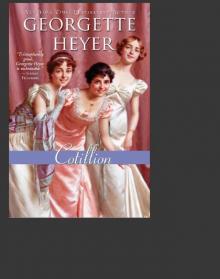 Cotillion
Cotillion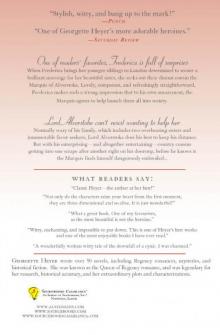 Frederica
Frederica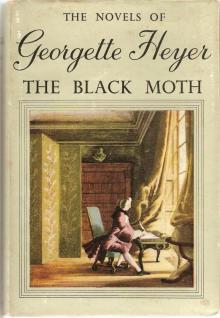 The Black Moth: A Romance of the XVIIIth Century
The Black Moth: A Romance of the XVIIIth Century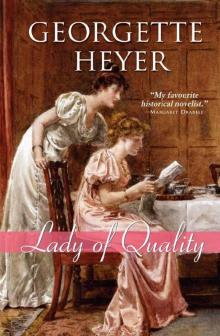 Lady of Quality
Lady of Quality Snowdrift and Other Stories
Snowdrift and Other Stories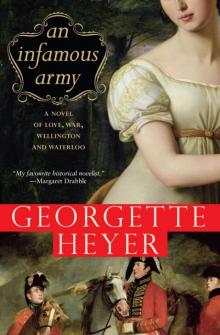 An Infamous Army
An Infamous Army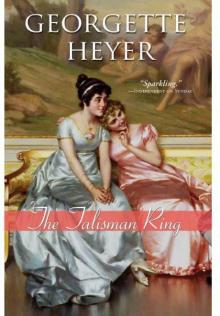 The Talisman Ring
The Talisman Ring Venetia
Venetia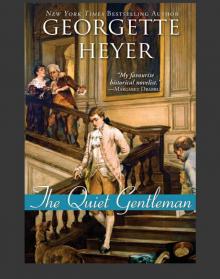 The Quiet Gentleman
The Quiet Gentleman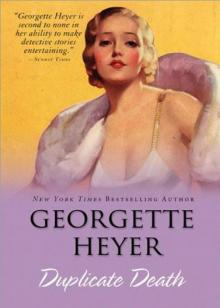 Duplicate Death
Duplicate Death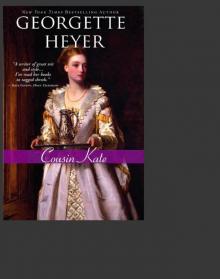 Cousin Kate
Cousin Kate Black Sheep
Black Sheep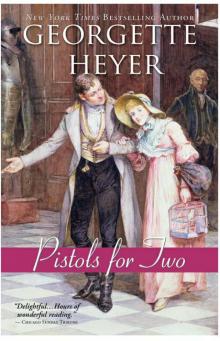 Pistols for Two
Pistols for Two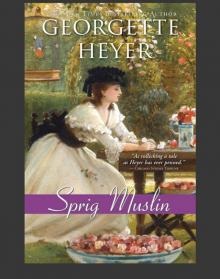 Sprig Muslin
Sprig Muslin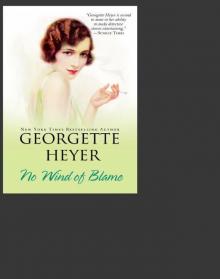 No Wind of Blame
No Wind of Blame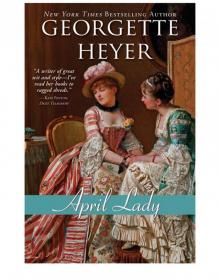 April Lady
April Lady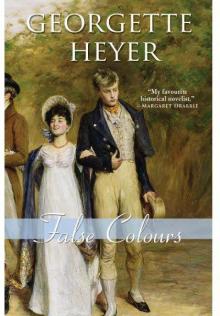 False Colours
False Colours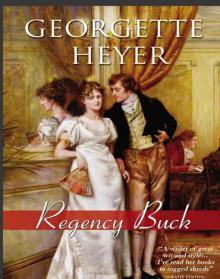 Regency Buck
Regency Buck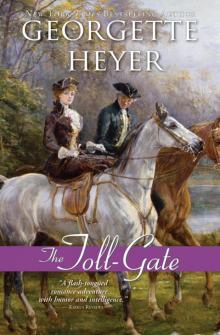 The Toll-Gate
The Toll-Gate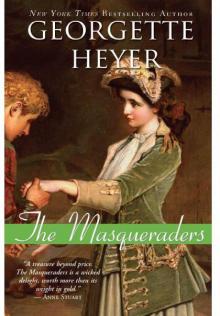 The Masqueraders
The Masqueraders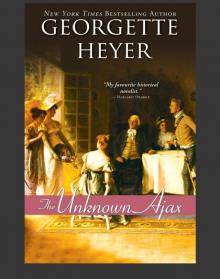 The Unknown Ajax
The Unknown Ajax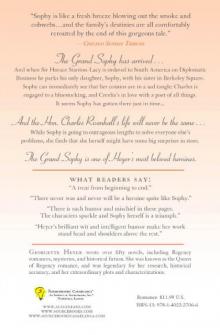 The Grand Sophy
The Grand Sophy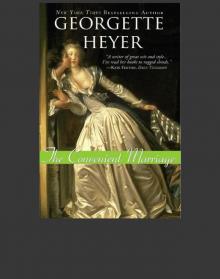 The Convenient Marriage
The Convenient Marriage Faro's Daughter
Faro's Daughter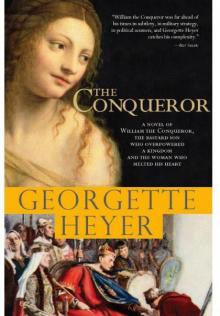 The Conqueror
The Conqueror The Foundling
The Foundling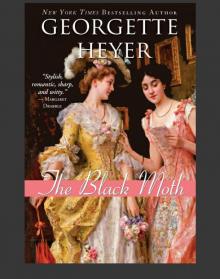 The Black Moth
The Black Moth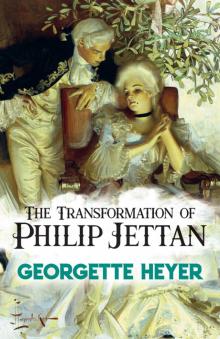 The Transformation of Philip Jettan
The Transformation of Philip Jettan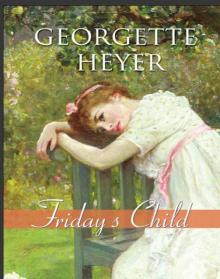 Friday's Child
Friday's Child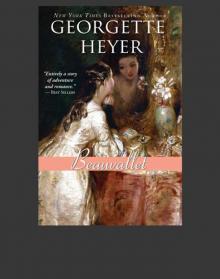 Beauvallet
Beauvallet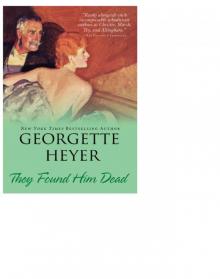 They Found Him Dead
They Found Him Dead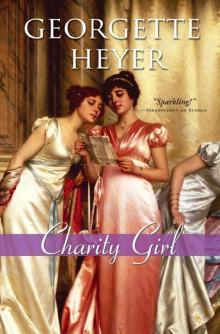 Charity Girl
Charity Girl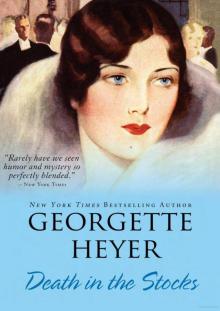 Death in the Stocks: Merely Murder
Death in the Stocks: Merely Murder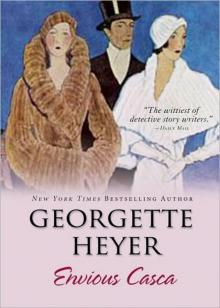 Envious Casca
Envious Casca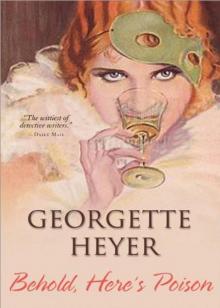 Behold, Here's Poison
Behold, Here's Poison Arabella
Arabella The Nonesuch
The Nonesuch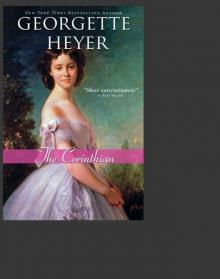 The Corinthian
The Corinthian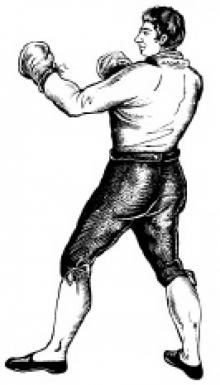 Jennifer Kloester
Jennifer Kloester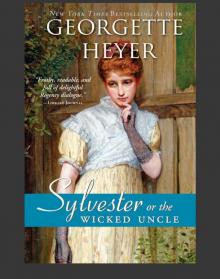 Sylvester
Sylvester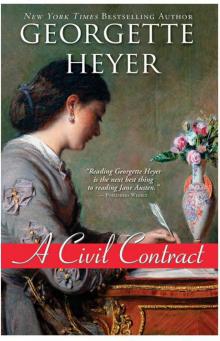 A Civil Contract
A Civil Contract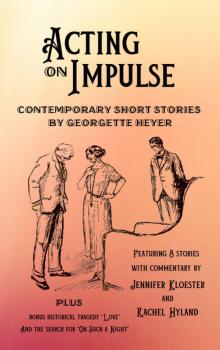 Acting on Impulse
Acting on Impulse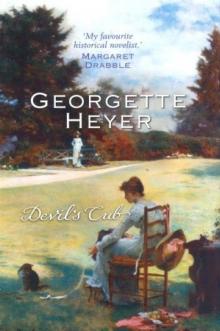 Devil’s Cub at-2
Devil’s Cub at-2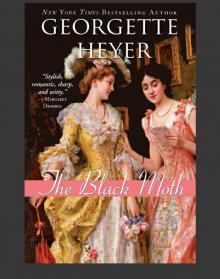 Black Moth
Black Moth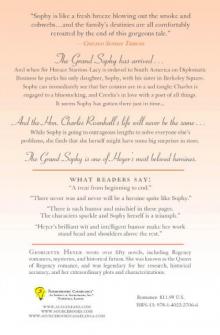 Grand Sophy
Grand Sophy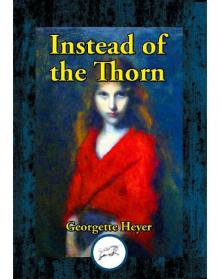 Instead of the Thorn
Instead of the Thorn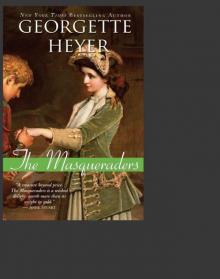 Masqueraders
Masqueraders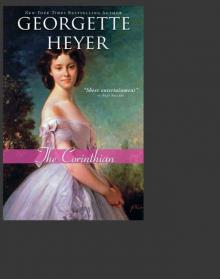 Corinthian
Corinthian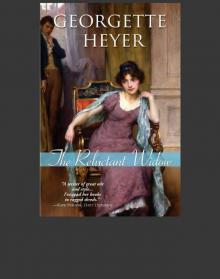 Reluctant Widow
Reluctant Widow